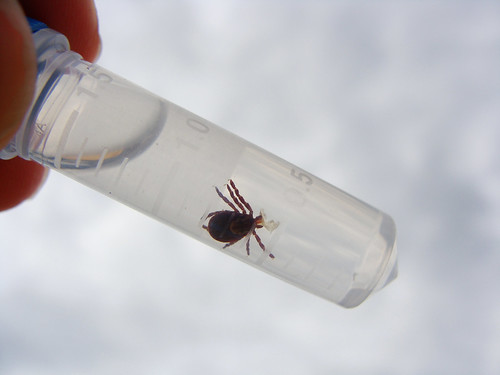Fall is still a good time to collect ticks
By the U of A System Division of Agriculture
Oct. 13, 2017
Fast facts:
- Summer is over, but ticks are still out there
- Collection kits available at county extension offices
(614 words)
(Download this story in MS Word format here.)
FAYETTEVILLE, Ark. – We all know It’s hard to avoid blood-sucking ticks when the weather is warm, but we also encounter them in the fall during hunting, hiking or other outdoor activities.
The University of Arkansas System Division of Agriculture wants you to use that to your advantage as part of a statewide citizen-scientist study of ticks and the diseases they carry.
“This project will provide much-needed statewide information on tick distribution and the diseases they carry,” said Kelly Loftin, extension entomologist with the University of Arkansas System Division of Agriculture. “There have been a few previous tick and tick-borne disease studies conducted in Arkansas, most have been small scale - concentrated on one disease, a region or a certain tick species.”
“Anyone can collect samples,” he said. “Hunters who find live ticks on harvested deer; hikers, gardeners and folks who are active in the outdoors; pet owners whose dogs or cats have some hitchhikers, and anyone with an interest in being part of a statewide science project that will provide some important answers for questions surrounding this public health issue.”
The fall hunting season provides an excellent opportunity for tick collecting. Species such as the black-legged tick are more commonly encountered during the fall, and like the lone star tick, are closely associated with white-tailed deer. Harvested deer often harbor many ticks. Often hunters will find detached and attached ticks on a recently harvested animal. Hikers, horseback riders and others also encounter ticks during this time of year.
The Division of Agriculture has distributed collection kits to all of its county extension offices. The kits include instructions on removing live and intact specimens and vials in which to place the collected ticks.
It’s important that the collected ticks still retain their mouthparts. Those collecting ticks will be asked to provide GPS coordinates or name of the park, address or a permanent landmark for where the ticks were found. The collectors will remain anonymous. Tick kits can be picked up and returned filled with ticks to your local county extension office.
The study is not intended to diagnose individuals who suspect they might have contracted a tick-borne disease. Instead, it will help identify areas with a high tick-borne disease risk.
The study is funded by a grant from the Arkansas Biosciences Institute. Tick identification and polymerase chain reaction analysis will be conducted by entomology faculty and students of the Arkansas Agricultural Experiment Station, the research arm of the Division of Agriculture. The study is in its second year, and results will be published after its third and final year.
For more information about the project, contact your county extension office. To find your nearby office, see www.uaex.uada.edu/counties.
About the Division of Agriculture
The University of Arkansas System Division of Agriculture’s mission is to strengthen agriculture, communities, and families by connecting trusted research to the adoption of best practices. Through the Agricultural Experiment Station and the Cooperative Extension Service, the Division of Agriculture conducts research and extension work within the nation’s historic land grant education system.
The Division of Agriculture is one of 20 entities within the University of Arkansas System. It has offices in all 75 counties in Arkansas and faculty on five system campuses.
Pursuant to 7 CFR § 15.3, the University of Arkansas System Division of Agriculture offers all its Extension and Research programs and services (including employment) without regard to race, color, sex, national origin, religion, age, disability, marital or veteran status, genetic information, sexual preference, pregnancy or any other legally protected status, and is an equal opportunity institution.
# # #
Media Contact: Mary Hightower
Dir. of Communication Services
U of A System Division of Agriculture
Cooperative Extension Service
(501) 671-2126
mhightower@uada.edu
Related Links
